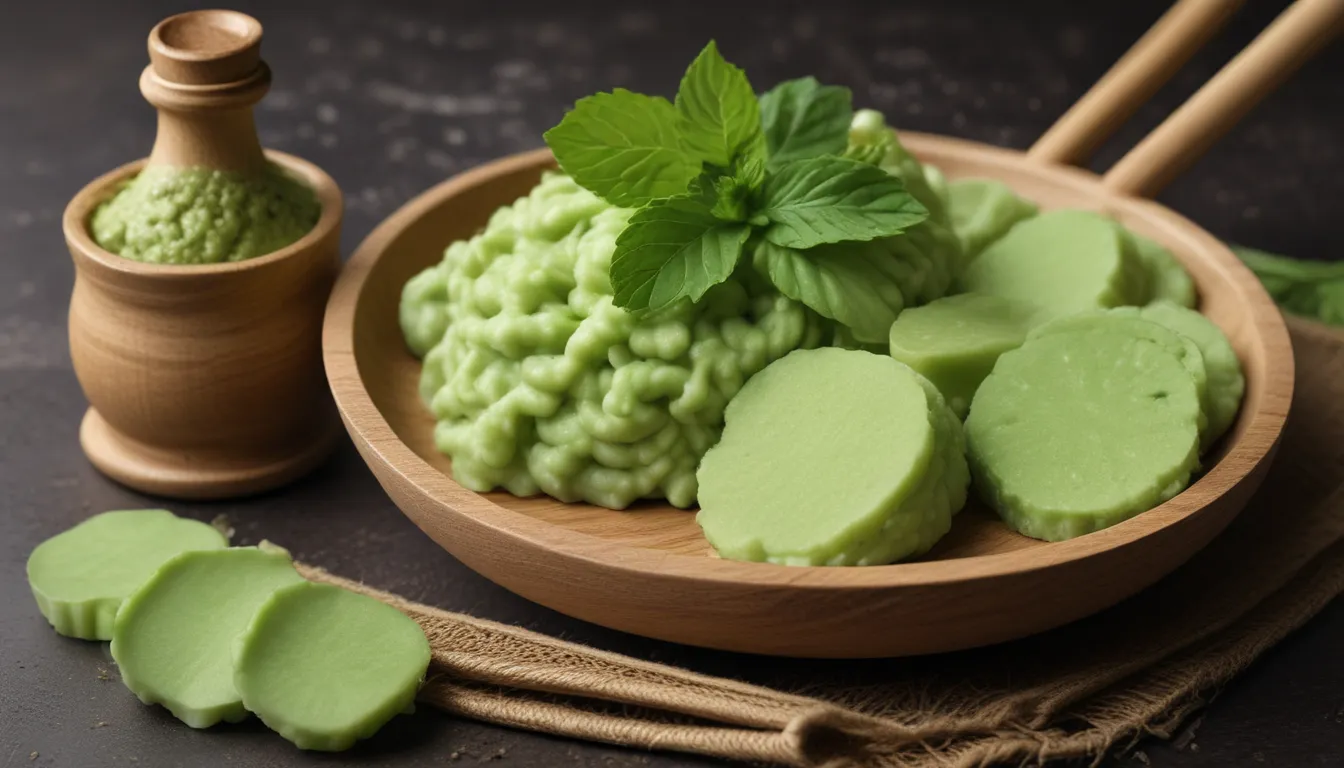The pictures in our articles might not always show exactly what the text is talking about. We use these images to make the article more interesting and eye-catching. They are there to add to the text, but not to replace it or show every detail.
Are you a fan of the fiery kick and distinct aroma of wasabi? This popular condiment is not just about adding flavor to your favorite sushi or Japanese dishes; it also packs a nutritional punch that might surprise you. In this article, we delve into the world of wasabi to uncover its fascinating nutrition facts, potential health benefits, and creative ways to incorporate it into your diet. Get ready to spice up your knowledge with the spicy and nutritious delight of wasabi!
Discover the Delightful Nutrition of Wasabi
Low-Calorie Wonder
One remarkable feature of wasabi is its low-calorie content. With only around 30 calories per tablespoon, adding this flavorful condiment to your meals or snacks is a guilt-free indulgence.
Fiber Powerhouse
Surprisingly, wasabi is a source of dietary fiber, essential for digestive health, blood sugar regulation, and weight management. Just one tablespoon of wasabi provides approximately 1 gram of dietary fiber to support your well-being.
Antioxidant Richness
Loaded with various antioxidants, wasabi helps protect your body from free radicals, promoting overall health and reducing the risk of chronic diseases. Embrace the benefits of these powerful antioxidants with every bite of wasabi.
Essential Vitamins and Minerals
Wasabi is not just about flavor; it also offers essential vitamins and minerals. It's a good source of vitamin C for immune support and collagen production, along with small amounts of potassium, magnesium, and calcium crucial for various bodily functions.
Health Benefits of Wasabi
Anti-Inflammatory Ally
Thanks to compounds called isothiocyanates, wasabi possesses anti-inflammatory properties that can help reduce inflammation in the body. This could potentially benefit conditions like arthritis and inflammatory bowel disease.
Natural Antibacterial Agent
The antibacterial properties of isothiocyanates in wasabi contribute to overall wellness by fighting harmful bacteria in the body. Embrace the natural antibacterial action of wasabi to support a healthy immune system.
Nasal Clearing Sensation
Experience the refreshing sensation of wasabi as it clears your sinuses. The compounds in wasabi can help alleviate nasal congestion, providing relief and a unique sensory experience.
Potential Cancer Fighter
Studies suggest that the isothiocyanates found in wasabi may have anticancer properties, inhibiting the growth of certain cancer cells and potentially reducing the risk of specific types of cancer. Embrace the potential cancer-fighting benefits of this fiery condiment.
Digestive Aid
Traditionally used in Japanese cuisine to aid digestion, wasabi's spiciness stimulates the production of digestive enzymes, promoting efficient digestion and relieving discomfort. Enjoy the culinary tradition of using wasabi for digestive support.
Culinary Exploration with Wasabi
Versatile Flavor Enhancer
While commonly associated with sushi and Japanese cuisine, wasabi's versatility extends to various dishes. Use it to elevate the flavors of sauces, dressings, marinades, and even unique desserts. Embark on a culinary adventure with the diverse applications of wasabi.
Spicy Sensation
The signature spicy kick of wasabi comes from compounds called allyl isothiocyanates that stimulate nerve endings in the mouth. These compounds provide the fiery sensation that makes wasabi a favorite among spice enthusiasts. Embrace the unique spiciness of this flavorful condiment.
Natural Food Preservative
Harnessing its natural antimicrobial properties, wasabi is used as a food preservative in Japan to inhibit the growth of certain bacteria and extend the shelf life of perishable foods. Embrace the natural preservative qualities of wasabi for food safety.
Understanding Wasabi Products
Sodium Considerations
Commercially available wasabi products like paste or powder may contain added salt or sodium. If you're monitoring your sodium intake, opt for low-sodium or sodium-free options by reading labels carefully. Be mindful of your sodium consumption when enjoying wasabi products.
Authentic Wasabi Appreciation
Authentic wasabi, known as "hon-wasabi," is prized for its unique flavor and health benefits derived from the rhizome of the Wasabia japonica plant. While authentic wasabi may be rare and costly, many products use horseradish and food coloring to mimic its taste without the same nutritional advantages.
Mindful Consumption Culture
Although wasabi offers potential health benefits, it's essential to consume it mindfully and in moderation. The intense flavor and spiciness of wasabi may not be suitable for everyone, especially those with sensitive stomachs or specific medical conditions. Listen to your body and consult a healthcare professional if you have concerns.
Embrace the Fiery Flavor and Nutrition of Wasabi
With its low-calorie content, fiber, antioxidants, and potential health benefits, wasabi is more than just a condiment; it's a flavorful addition to a balanced diet. Whether you enjoy it with sushi, in sauces, or as a unique flavor enhancer, embrace the spicy and nutritious delight of wasabi in moderation for a culinary experience that tantalizes your taste buds and supports your well-being.
Frequently Asked Questions (FAQs) about Wasabi
Is wasabi spicy?
Yes, wasabi is known for its spicy flavor due to compounds like allyl isothiocyanates that provide that fiery sensation when consumed.
Can wasabi help with nasal congestion?
Absolutely, the consumption of wasabi can help clear nasal congestion by stimulating the sinuses and providing a refreshing experience.
Are all wasabi products authentic?
Not all wasabi products are authentic; many commercial options use horseradish and food coloring, offering a similar taste without the same nutritional benefits.
Can wasabi be too spicy for some individuals?
Yes, the spiciness of wasabi may be too intense for individuals with sensitive stomachs, specific medical conditions, or those unaccustomed to spicy foods.
Can wasabi cause allergies?
While rare, some individuals may be allergic to wasabi. If you experience adverse reactions like hives, swelling, or difficulty breathing, seek immediate medical attention.
Embrace the fiery flavor and nutritional benefits of wasabi while exploring its versatile culinary applications. Learn about the health benefits and mindful consumption of this intriguing condiment to elevate your gastronomic experience and well-being. Trust in the authentic, informative content we provide as you journey through the world of wasabi with curiosity and taste exploration.






